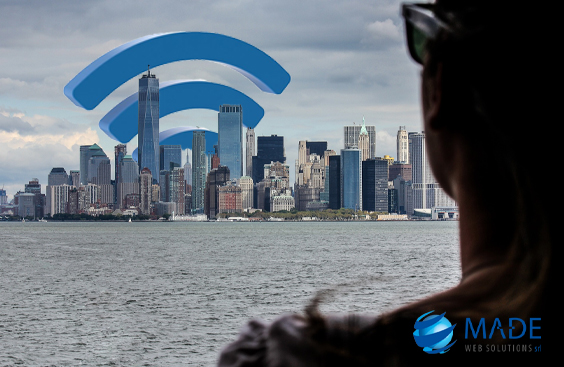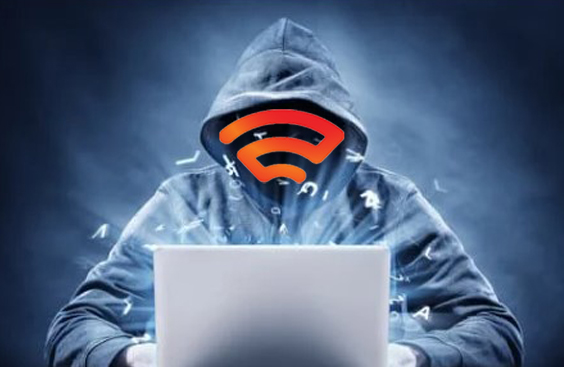Public Wi-Fi: convenience or danger? Here's how to protect your connection

You are out and about in the city, perhaps waiting for an appointment or a friend, and you need to connect to the Internet to check your e-mail, send a message or look for information about a place or an event. What do you do? If you have a smartphone or tablet connected to a public Wi-Fi network, the solution is simple and straightforward.
But do we really know what public Wi-Fi networks are and what risks they pose?
Public Wi-Fi networks are Internet connections available in public places such as cafes, restaurants, airports, stations and other gathering places.
These connections can be free or chargeable and allow anyone to access the Internet via their device. But what are the advantages of these connections?
Firstly, access to a public Wi-Fi network can be extremely convenient, especially when one does not have a data connection or wants to save on data traffic costs. Moreover, they can be useful for work or leisure, allowing you to connect anywhere and anytime.
However, using a public Wi-Fi connection also entails some security risks. For instance, information transmitted over a public Wi-Fi network can be intercepted by malicious attackers, putting personal data, banking information and other sensitive data at risk.
This is why it is important to take some security measures to protect your public Wi-Fi connection. In this article, our web agency will provide you with some tips on how to protect your public Wi-Fi connection in order to minimise security risks and enjoy the benefits of connecting to the Internet wherever you are.
The public Wi-Fi trap: the hidden dangers you need to know before connecting
The use of public Wi-Fi networks can be very convenient, but it can also pose a security risk to your data. In this article, we will explain the dangers of using a public Wi-Fi connection and how to protect your privacy online.
Theft of personal and banking data
One of the biggest concerns when using a public Wi-Fi network is the theft of personal and banking data.
When you connect to an unsecured Wi-Fi network, your sensitive data such as your first name, last name, address, phone number, and payment information can be easily intercepted by malicious attackers.

To protect your data, we advise you to avoid accessing websites that request sensitive information, such as payment information, while connected to a public Wi-Fi network. Furthermore, we recommend that you only use websites with an HTTPS connection, which are encrypted and secure.
Malware
Another risk of using a public Wi-Fi network is infection by malware. Malware are malicious computer programmes that can infect your device via an unsecured Wi-Fi network.
To avoid infecting your device, we recommend installing antivirus software on your device and updating it regularly. Also, avoid downloading files from untrusted sources and opening suspicious e-mails.
Phishing attacks
Phishing attacks are another common threat associated with the use of public Wi-Fi networks. Phishing attacks are fraud attempts that try to convince you to provide personal or banking information.
To avoid becoming a victim of phishing attacks, avoid providing personal or banking information to websites that seem suspicious or untrustworthy. Also, always check the website address, making sure it is the correct one and not a fraudulent copy.
Other types of cyber attacks
Finally, using a public Wi-Fi network can expose your device to other types of cyber attacks such as man-in-the-middle attacks by sniffing packets passing through the Wi-Fi network.
To protect yourself from these types of attacks, we recommend using a VPN (Virtual Private Network) that encrypts your connection and protects your data from intruders.
Public Wi-Fi: What to do in the event of a security breach
As we explained in the previous section, the risks associated with using a public Wi-Fi connection are real and cannot be underestimated.
But what to do in the event of a security breach?
Don’t worry, our agency will provide you with some tips on how to protect your public Wi-Fi connection and what to do in the event of a security breach.
1.Disconnect immediately: If you suspect that your public Wi-Fi connection has been compromised, disconnect from the network immediately.
This will prevent hackers from accessing your sensitive data.
2.Change passwords: If you have used passwords or credentials when connecting to the public Wi-Fi network, change them immediately.
Use complex passwords and be sure to use different passwords for each account.
3.Report the incident: If you have suffered a security breach, it is important to report the incident to the relevant authorities. This will help prevent future breaches and protect other users.

4.Use a VPN: a VPN (Virtual Private Network) is software that allows you to surf safely on a public network. By using a VPN, your data is encrypted and protected from hackers or malware.
5.Update your software and devices regularly: make sure you regularly install software and firmware updates on your devices.
These updates often fix security vulnerabilities and improve the protection of your devices.
6.Disable file sharing: If you use a public Wi-Fi network, be sure to disable file sharing. This will prevent other network users from accessing your files and personal data.
Public Wi-Fi: Conclusions
Using a public Wi-Fi connection can pose security risks to your personal and banking data. However, there are several security measures that can be taken to protect one’s public Wi-Fi connection, such as using a VPN, disabling automatic Wi-Fi and regularly updating devices and software.
It is important to be aware of the dangers that can arise from using a public Wi-Fi network and to take appropriate security measures to protect your data.
If you need further security advice, please do not hesitate to contact us.
We are always ready to offer support and advice to ensure the maximum protection of your data.

